Overview
Enterprise Resource Planning (ERP) systems stand as comprehensive software solutions that integrate and optimize critical business processes across organizations, significantly enhancing real-time data processing and decision-making capabilities. These systems, especially cloud-based solutions like 10X ERP, are pivotal in improving operational efficiency and productivity. Notably, statistics reveal that:
- 78% of organizations experience enhanced productivity.
- 40% report reduced IT expenses following implementation.
This compelling data underscores the transformative impact of ERP systems, making them an essential consideration for organizations aiming to streamline their operations.
Introduction
Understanding the intricacies of Enterprise Resource Planning (ERP) systems is essential for businesses striving to enhance operational efficiency and adaptability in an ever-evolving marketplace. These comprehensive software solutions unify critical business processes and empower organizations to make informed decisions through real-time data insights.
However, with a myriad of options and deployment strategies available, how can companies navigate the complexities of ERP systems to find the best fit for their unique needs? This question is pivotal for organizations looking to thrive in today’s competitive landscape.
Define Enterprise Resource Planning (ERP) Systems
To understand what is enterprise resource planning, one can look at enterprise resource planning (ERP) applications, which represent comprehensive software solutions designed to unify and optimize critical business processes across an organization. By providing a cohesive perspective on operations, these solutions enable real-time data processing, enhancing decision-making capabilities. ERP integrates a wide array of functions, including finance, human resources, supply chain management, manufacturing, and customer relationship management, all within a single platform.
Recent advancements in ERP technology have markedly improved the user experience for distributors. For instance, cloud-based solutions like 10X ERP have surged in popularity, with 65% of companies opting for them in 2023. This transition fosters increased flexibility and scalability, which are vital for expanding businesses. Additionally, 78% of organizations reported enhanced productivity following ERP implementation, underscoring the tangible benefits these solutions provide.
Contemporary ERP solutions boast key features such as robust accounting functionalities, dependable inventory management, and seamless integration capabilities with other software. 10X ERP exemplifies these attributes with its all-inclusive platform, ensuring best-in-class accounting, inventory, vendor, and customer management, all under a transparent pricing structure. These features not only automate processes but also centralize data, resulting in improved operational efficiency and reduced costs. For example, firms that adopted ERP solutions have experienced a 40% reduction in IT expenses and a 38% decrease in inventory levels, showcasing the financial advantages of such approaches.
Real-world examples further illustrate the effectiveness of ERP solutions. A prominent case is 10X ERP, which has adeptly addressed common pain points for distributors by streamlining operations and boosting productivity through real-time data processing. Client testimonials emphasize the platform’s user-friendly interface, responsive support, and ongoing product enhancements, establishing it as a preferred choice in the marketplace.
Industry leaders underscore the critical role of what is enterprise resource planning in achieving business success. A recent survey indicated that 95% of companies experience process improvements after implementing ERP systems, highlighting their significance in reaching operational objectives. As organizations increasingly prioritize digital transformation, the integration of advanced technologies like AI and machine learning into ERP solutions is expected to further augment their capabilities, making them indispensable tools for modern enterprises.
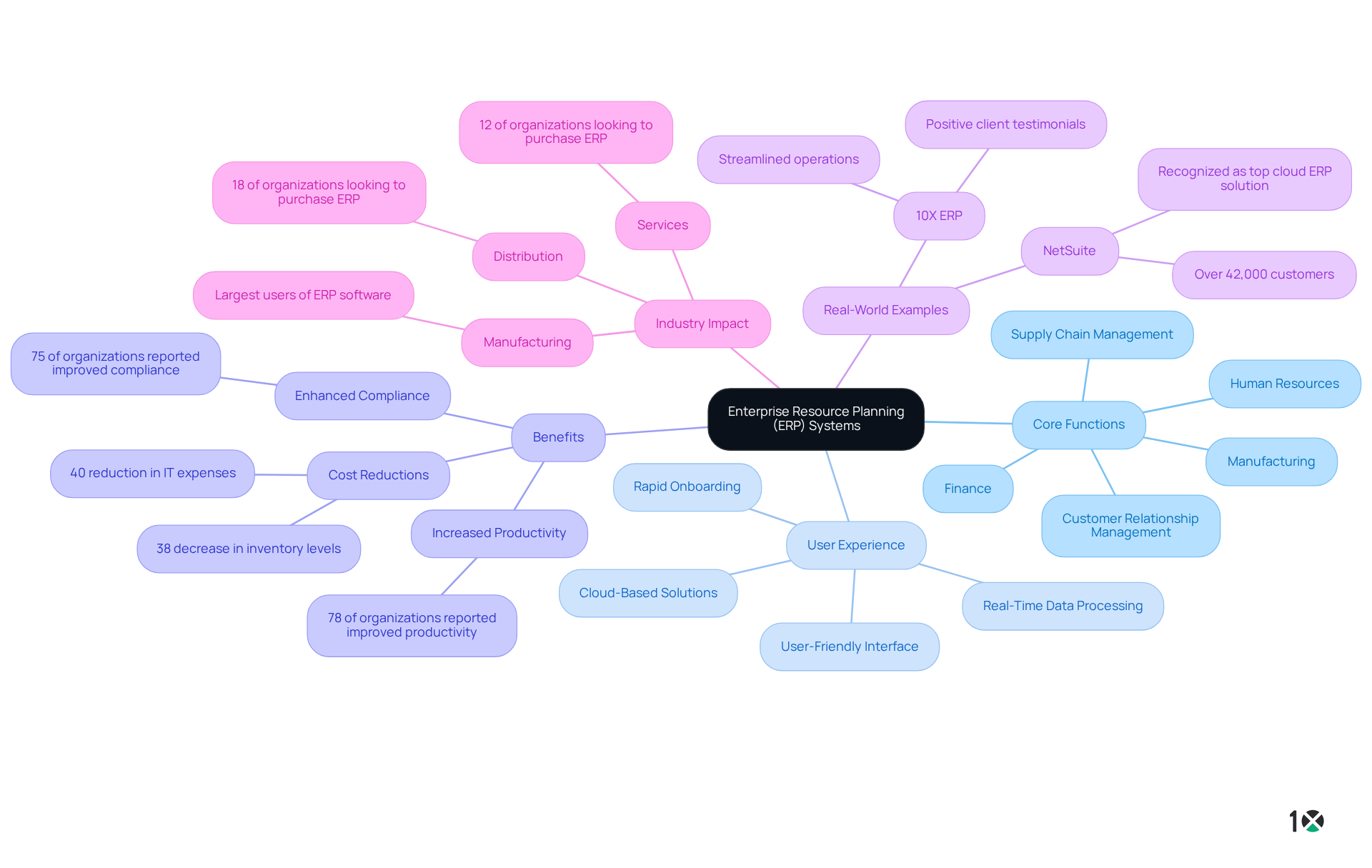
Trace the Evolution and Importance of ERP Systems
The concept of ERP solutions originated in the 1960s with the introduction of Material Requirements Planning (MRP), which primarily focused on inventory management and production scheduling. As businesses grew and operations became more complex, the need for integrated solutions surfaced, leading to the advancement of MRP II in the 1980s. This version added functionalities such as finance and human resources, reflecting a more comprehensive operational scope. By the 1990s, the phrase ‘what is enterprise resource planning’ gained recognition, encapsulating the all-encompassing nature of these solutions.
Today, understanding what is enterprise resource planning is vital for organizations of all sizes, enabling adaptability to market fluctuations, enhancing operational efficiency, and providing a competitive advantage. Recent statistics reveal that:
- 66% of organizations report improved operational efficiency following ERP implementation.
- 78% experience productivity enhancements.
Furthermore, expert opinions underscore the critical role of ERP solutions, or what is enterprise resource planning, in streamlining processes and consolidating data across departments, making them indispensable for modern business success.
In this landscape, 10X ERP emerges as a robust cloud-based solution specifically designed for distributors. It offers real-time data processing, optimized inventory management, and seamless integrations. With its transparent pricing model and comprehensive features, 10X ERP not only boosts operational flexibility but also guarantees exceptional support throughout the ERP journey, effectively addressing the unique needs of operations managers.
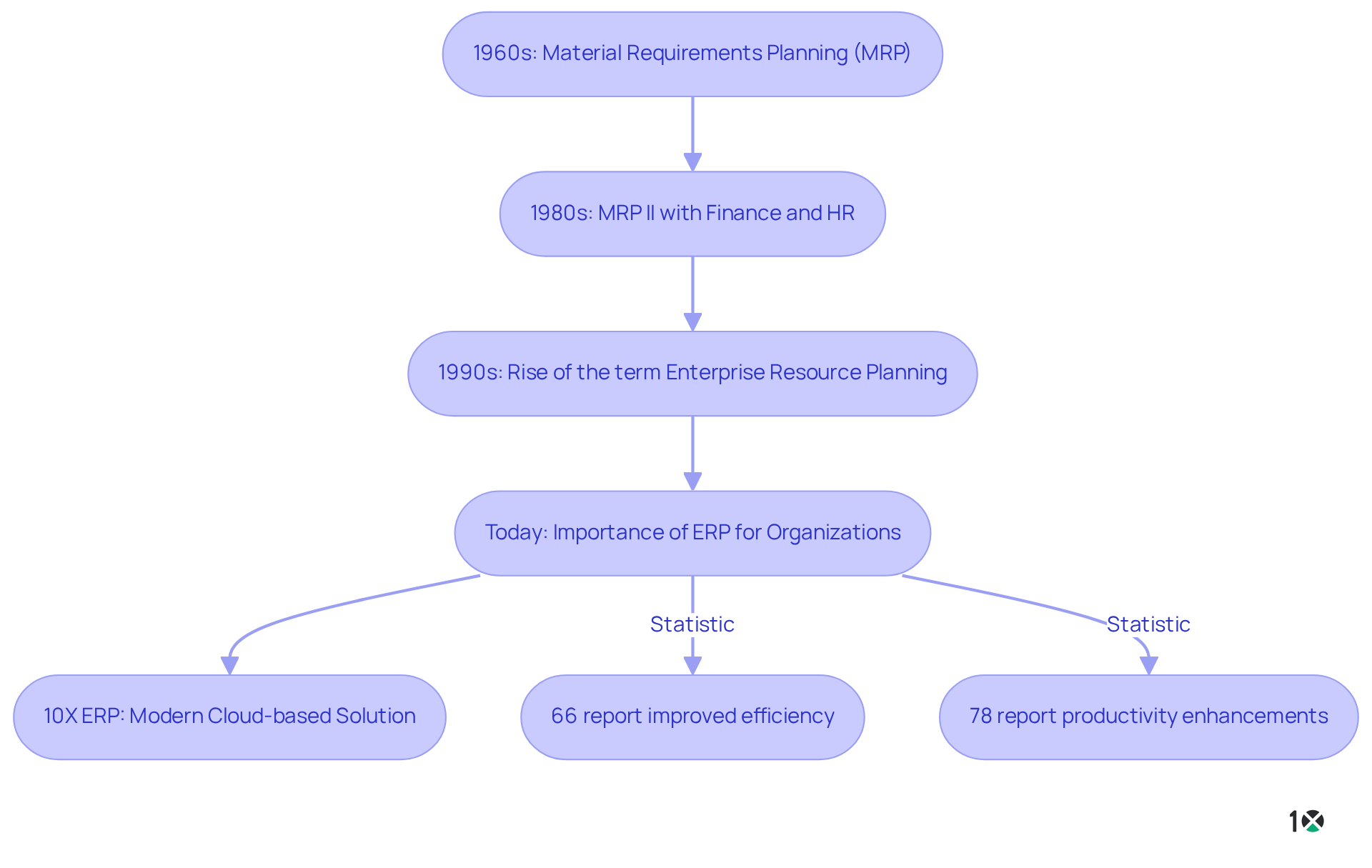
Identify Core Components and Functionalities of ERP Systems
The core components of ERP systems are crucial for enhancing operational efficiency and data visibility, especially for distributors. Key functionalities include:
-
Finance and Accounting: This module manages financial transactions, budgeting, and reporting, providing real-time insights that empower entities to make informed decisions. With 10X ERP’s robust accounting features, including real-time data processing and a comprehensive audit trail, stakeholders are equipped to make better decisions.
-
Human Resources (HR): By streamlining employee management, payroll, and recruitment processes, the HR module ensures that companies can effectively handle their workforce data and future staffing needs, which is vital for compliance and operational efficiency.
-
Supply Chain Management: This component oversees procurement, inventory management, and logistics, enabling distributors to maintain optimal inventory levels and enhance vendor interactions. The integration of supply chain functionalities can lead to a remarkable 91% optimization in inventory levels, underscoring its significance. With 10X ERP’s customizable attributes and powerful cross-referencing, distributors can track inventory seamlessly.
-
Manufacturing: Facilitating production planning, scheduling, and quality control, the manufacturing module is essential for firms aiming to improve product quality and accelerate time-to-market, thereby driving innovation and competitiveness.
-
Customer Relationship Management (CRM): By enhancing customer interactions and sales processes, the CRM module provides insights into customer orders and preferences, allowing for personalized service that boosts overall customer satisfaction.
-
Business Intelligence: This module offers analytics and reporting tools that enable informed decision-making. By leveraging data extraction capabilities, organizations can track performance metrics and pinpoint inefficiencies, leading to improved operational strategies.
These components work in unison to create a cohesive ERP framework, illustrating what is enterprise resource planning, as it streamlines processes and fosters collaboration across departments, ultimately driving growth and efficiency in distribution operations.
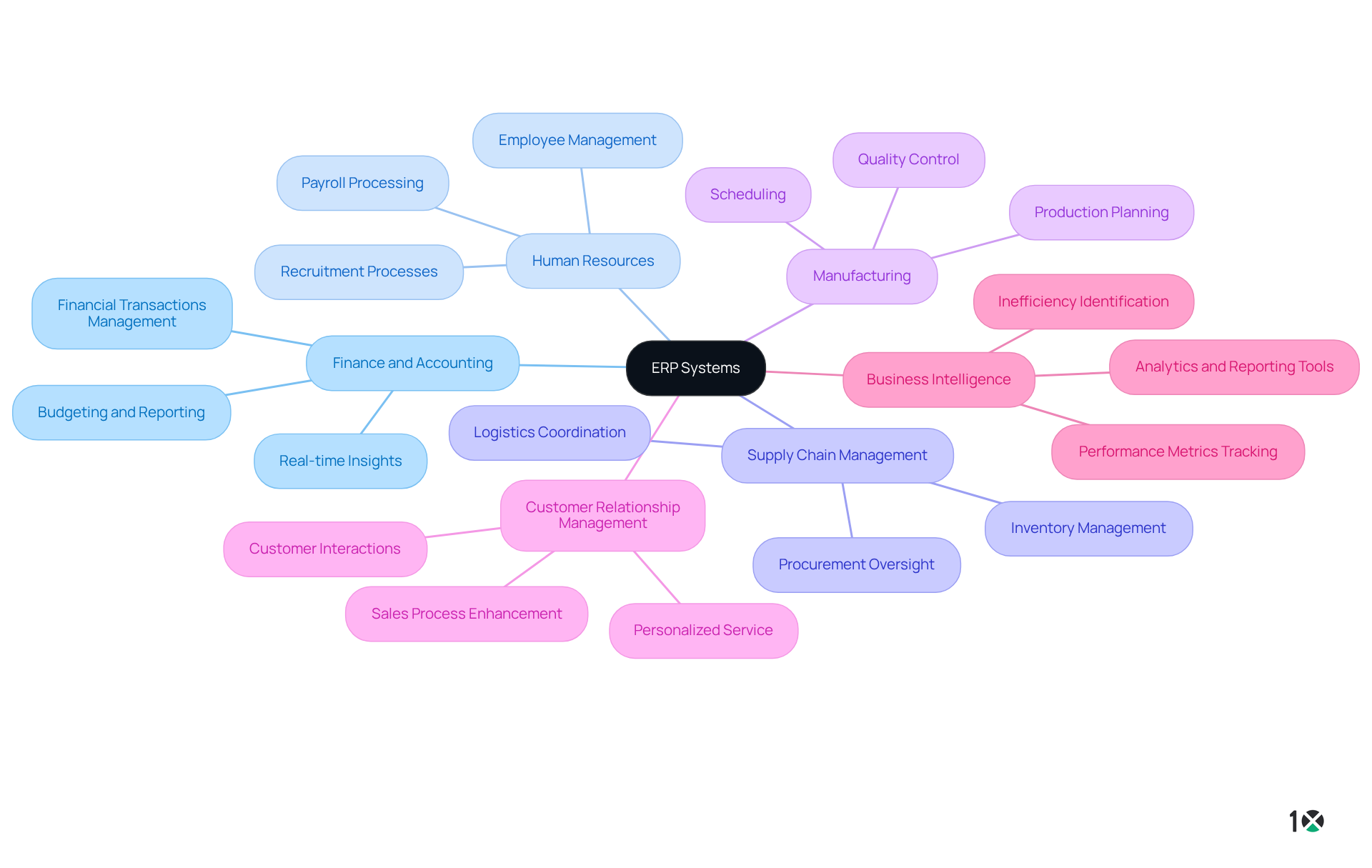
Explore Types and Deployment Options of ERP Systems
ERP systems can be categorized into several deployment options, each tailored to meet different business needs, particularly for distributors utilizing 10X ERP’s capabilities.
On-Premise ERP: This type is installed locally on a company’s servers, offering complete control over data and extensive customization capabilities. However, it requires significant IT resources and ongoing maintenance, which can be a barrier for smaller entities.
Cloud-Based ERP: Hosted on the vendor’s servers, cloud-based ERP solutions like 10X ERP provide flexibility, scalability, and lower upfront costs. This model is particularly advantageous for growing businesses, as it allows for rapid deployment and access to real-time data without the need for extensive IT infrastructure. In fact, 64.5% of companies have chosen cloud ERP solutions over traditional on-premise setups, reflecting a significant shift in preference. 10X ERP enhances this model with its real-time data processing capabilities, ensuring that distributors can make informed decisions quickly.
Hybrid ERP: Merging the advantages of both on-premise and cloud solutions, hybrid ERP setups allow organizations to utilize the benefits of each model. This approach enables businesses to maintain critical data on-site while leveraging cloud capabilities for scalability and flexibility. As companies increasingly seek to optimize their operations, hybrid deployments are becoming a popular choice, particularly among small to medium enterprises. 10X ERP supports hybrid models by integrating effortlessly with current frameworks, offering a comprehensive inventory management solution.
Each deployment option presents unique advantages and challenges. To choose the most appropriate ERP solution, businesses must carefully assess their specific needs, budget limitations, and IT capabilities, which are essential to understanding what is enterprise resource planning. Significantly, 91% of firms with at least one stage of their ERP project operational for a year or more achieved optimized inventory levels, demonstrating the efficiency of ERP solutions in enhancing inventory management. Furthermore, the API-first strategy of 10X ERP facilitates seamless integration with other software, improving the adaptability and scalability of cloud and hybrid ERP solutions. With the cloud ERP market expected to expand at a compound annual growth rate of 16%, the shift towards cloud-based solutions is evident, making it crucial for businesses to remain aware of their choices.
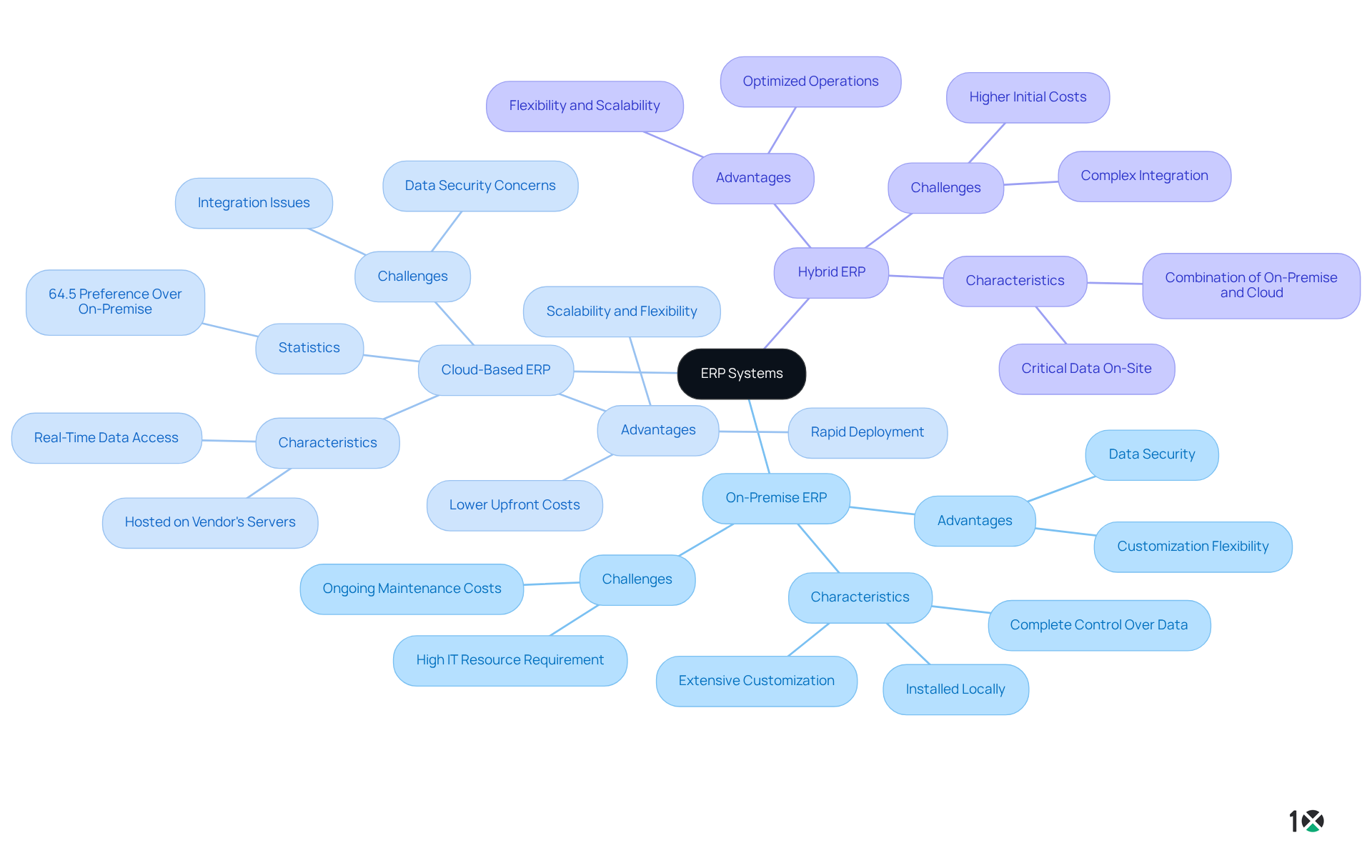
Examine the Benefits of Implementing ERP Systems
Implementing an ERP system like 10X ERP presents a multitude of benefits that can transform your organization:
-
Improved Efficiency: Automating routine tasks drastically reduces manual effort and minimizes errors. Remarkably, 78% of entities have reported enhanced productivity following implementation.
-
Enhanced Data Visibility: Centralized data offers real-time insights, facilitating superior decision-making. Notably, 70% of companies leveraging ERP analytics have observed improved decision-making capabilities. With 10X ERP’s premier cloud hosting and real-time data processing, organizations can access critical information instantly.
-
Cost Savings: Streamlined processes contribute to lower operational costs. Approximately 40% of companies realize IT savings post-implementation of an ERP solution, while 62% report decreased expenses in procurement and inventory management. The transparent pricing framework of 10X ERP, which encompasses all functionalities, features, modules, tools, and dashboards, ensures that companies can budget effectively.
-
Scalability: ERP solutions are designed to grow with the business, adapting to increased complexity and volume—essential for organizations anticipating growth. The implementation of 10X ERP considers current infrastructures, data transfer, and user needs, ensuring a seamless transition.
-
Regulatory Compliance: Integrated compliance functionalities assist organizations in adhering to industry regulations, thereby reducing the risk of non-compliance penalties.
-
Better Customer Service: Enhanced data access leads to quicker response times and improved customer interactions, with 70% of businesses reporting a better customer experience after ERP implementation.
These benefits collectively foster a more agile and competitive organization, emphasizing what is enterprise resource planning and its strategic significance in today’s dynamic business landscape. If you’re prepared to discover how 10X ERP can revolutionize your operations, let’s initiate a conversation! Simply fill out our straightforward contact form to get started.
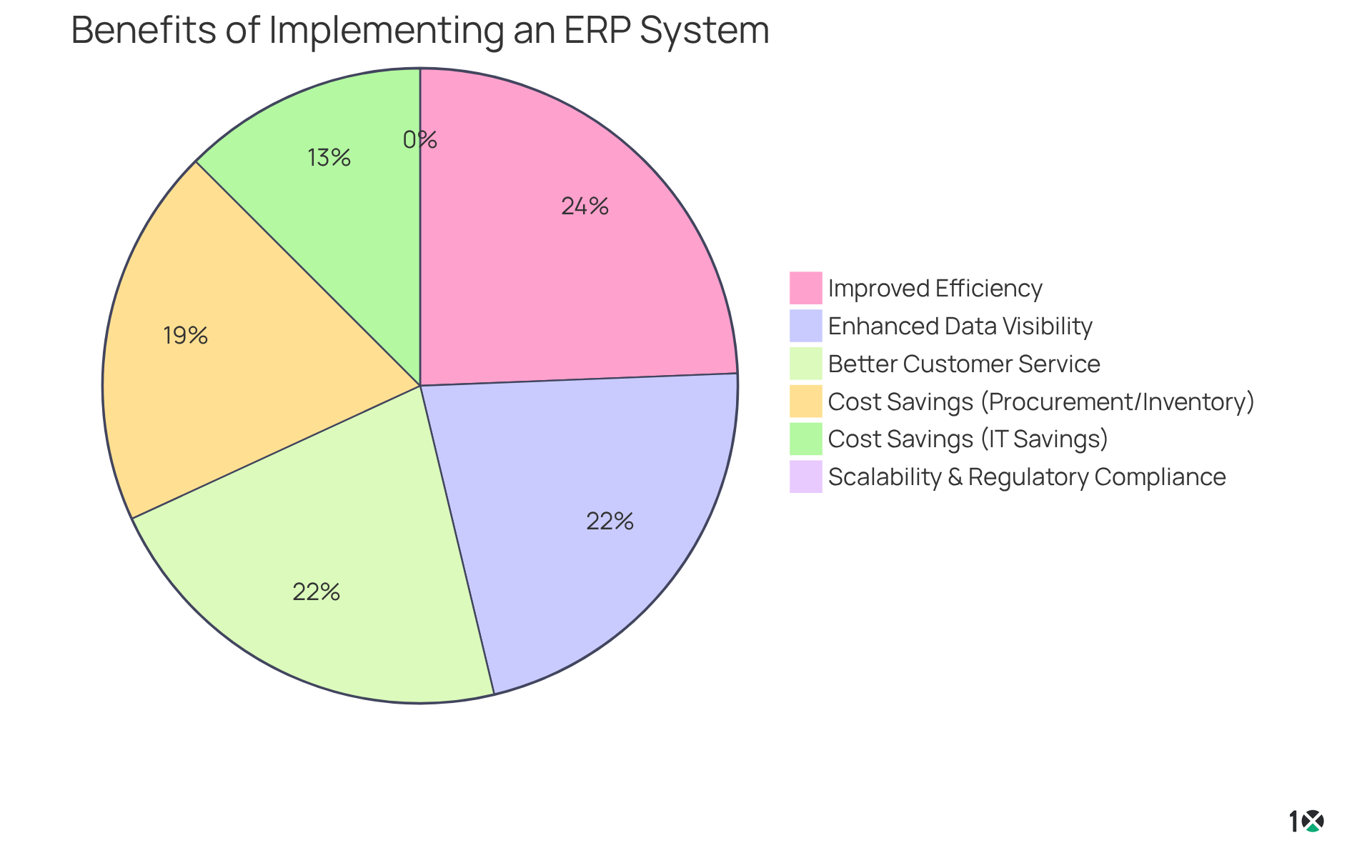
Conclusion
Understanding enterprise resource planning (ERP) systems is essential for organizations striving to enhance operational efficiency and competitiveness. These comprehensive software solutions integrate various business functions, providing a unified platform for real-time data processing and decision-making. By adopting ERP systems, companies can streamline processes, reduce costs, and improve productivity—an increasingly critical necessity in today’s dynamic business environment.
This article highlights key insights into the definition, evolution, core components, and benefits of ERP systems. From the historical context of ERP’s development to the modern capabilities of cloud-based solutions like 10X ERP, the discussion underscores the transformative impact these systems can have on organizations. Statistics reveal significant improvements in operational efficiency, productivity, and cost savings, demonstrating the tangible advantages of implementing ERP solutions.
In conclusion, embracing ERP systems represents a strategic move for businesses looking to thrive in a competitive landscape. As organizations continue to prioritize digital transformation, the integration of advanced technologies within ERP frameworks will further enhance their capabilities. For those seeking to optimize operations and achieve sustainable growth, exploring ERP options is not just beneficial; it is essential for success.
Frequently Asked Questions
What is an Enterprise Resource Planning (ERP) system?
An ERP system is a comprehensive software solution designed to unify and optimize critical business processes across an organization. It integrates various functions such as finance, human resources, supply chain management, manufacturing, and customer relationship management into a single platform, enabling real-time data processing and enhanced decision-making.
What are the recent trends in ERP technology?
Recent trends include a significant shift towards cloud-based solutions, with 65% of companies opting for them in 2023. This transition offers increased flexibility and scalability, which are essential for growing businesses.
What benefits do organizations experience from implementing ERP systems?
Organizations report various benefits from ERP implementation, including a 78% increase in productivity and a 66% improvement in operational efficiency. Additionally, firms that adopted ERP solutions have seen a 40% reduction in IT expenses and a 38% decrease in inventory levels.
What key features do modern ERP solutions offer?
Modern ERP solutions offer robust accounting functionalities, reliable inventory management, and seamless integration capabilities with other software. They also automate processes and centralize data, which improves operational efficiency and reduces costs.
Can you provide an example of a successful ERP solution?
10X ERP is an example of a successful ERP solution that addresses common pain points for distributors by streamlining operations and boosting productivity through real-time data processing. It is noted for its user-friendly interface, responsive support, and ongoing product enhancements.
How has the concept of ERP evolved over time?
The concept of ERP originated in the 1960s with Material Requirements Planning (MRP) focused on inventory management. It evolved through MRP II in the 1980s, adding finance and human resources functionalities. By the 1990s, the term ‘enterprise resource planning’ became recognized, reflecting the comprehensive nature of these solutions.
Why is understanding ERP important for organizations today?
Understanding ERP is vital for organizations of all sizes as it enables them to adapt to market fluctuations, enhance operational efficiency, and gain a competitive advantage. ERP systems are crucial for streamlining processes and consolidating data across departments.
What role do advanced technologies like AI and machine learning play in ERP systems?
Advanced technologies such as AI and machine learning are expected to augment ERP capabilities, further enhancing their functionality and making them indispensable tools for modern enterprises as organizations prioritize digital transformation.
